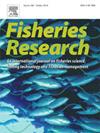Trends and drivers of French tropical tuna purse-seine vessel behavior in the Atlantic and Indian Oceans, 2004–2020
IF 2.2
2区 农林科学
Q2 FISHERIES
引用次数: 0
Abstract
This study examines the spatio-temporal trends in fishing practices at the fishing trip scale of the French tropical tuna purse-seine fleet in the Indian and Atlantic Oceans on 17 years, focusing on trends in fishing on free-swimming schools (FSC) versus fishing on floating objects (FOBs). Key metrics, such as trip duration, median speed, sinuosity, area explored and the fraction of sets of FOBs, were calculated to quantify fishing trip patterns, and a PCA analysis was conducted to explore relationships between these metrics. Our findings show a marked shift towards FOB fishing, likely driven by advancements in tracking technology, which have improved fishing efficiency and reduced search time, and changes in regulations and fishing context, which have provided unintentional incentives for FOB fishing. The data reveal distinct trends between oceans, with shorter fishing trips and a higher rate of FOB fishing in the Indian Ocean, likely linked to recent increases in skipjack tuna abundance and catch limits on yellowfin tuna in that ocean. Temporal changes in fishing trip metrics suggest that the key factors influencing fishing strategies include oceanographic variability, management regulations, and socio-economic conditions like piracy and fuel costs. Our analysis provides critical insights into how technological innovations and environmental factors shape fishing strategies, contributing to the sustainable management of tuna fisheries.
2004-2020年大西洋和印度洋法国热带金枪鱼围网渔船行为的趋势和驱动因素
本研究考察了17年来法国热带金枪鱼围网船队在印度洋和大西洋捕鱼的时空趋势,重点研究了在自由游鱼场(FSC)和漂浮物(FOBs)上捕鱼的趋势。计算了关键指标,如行程持续时间、中位数速度、弯曲度、探索面积和fob集的比例,以量化钓鱼行程模式,并进行了PCA分析,以探索这些指标之间的关系。我们的研究结果表明,离岸捕捞的显著转变可能是由跟踪技术的进步驱动的,跟踪技术提高了捕捞效率,减少了搜索时间,法规和捕捞环境的变化也为离岸捕捞提供了无意的激励。数据揭示了不同海洋之间的明显趋势,印度洋的捕鱼行程较短,离岸价捕鱼率较高,这可能与最近该海洋中鲣鱼数量的增加和黄鳍金枪鱼的捕捞限制有关。捕鱼行程指标的时间变化表明,影响捕鱼策略的关键因素包括海洋学变异性、管理法规以及海盗和燃料成本等社会经济条件。我们的分析为技术创新和环境因素如何影响捕捞策略提供了重要见解,有助于金枪鱼渔业的可持续管理。
本文章由计算机程序翻译,如有差异,请以英文原文为准。
求助全文
约1分钟内获得全文
求助全文
来源期刊

Fisheries Research
农林科学-渔业
CiteScore
4.50
自引率
16.70%
发文量
294
审稿时长
15 weeks
期刊介绍:
This journal provides an international forum for the publication of papers in the areas of fisheries science, fishing technology, fisheries management and relevant socio-economics. The scope covers fisheries in salt, brackish and freshwater systems, and all aspects of associated ecology, environmental aspects of fisheries, and economics. Both theoretical and practical papers are acceptable, including laboratory and field experimental studies relevant to fisheries. Papers on the conservation of exploitable living resources are welcome. Review and Viewpoint articles are also published. As the specified areas inevitably impinge on and interrelate with each other, the approach of the journal is multidisciplinary, and authors are encouraged to emphasise the relevance of their own work to that of other disciplines. The journal is intended for fisheries scientists, biological oceanographers, gear technologists, economists, managers, administrators, policy makers and legislators.
 求助内容:
求助内容: 应助结果提醒方式:
应助结果提醒方式:


